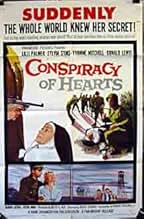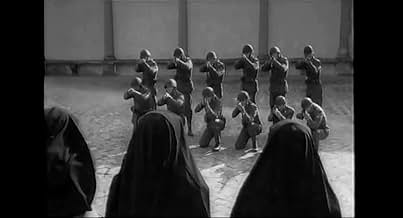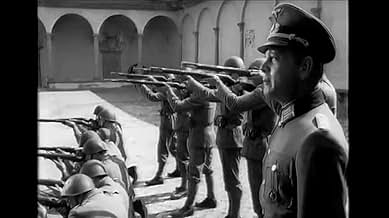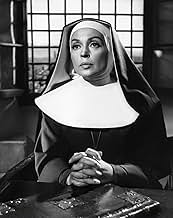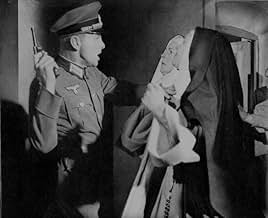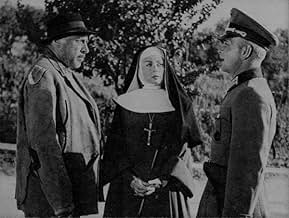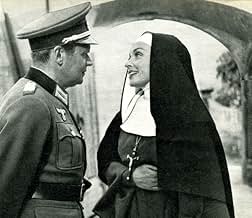IMDb RATING
7.1/10
588
YOUR RATING
Catholic nuns risk their lives to help Jewish children in an Italian internment camp escape to Palestine during World War II.Catholic nuns risk their lives to help Jewish children in an Italian internment camp escape to Palestine during World War II.Catholic nuns risk their lives to help Jewish children in an Italian internment camp escape to Palestine during World War II.
- Director
- Writers
- Stars
- Awards
- 1 nomination total
- Director
- Writers
- All cast & crew
- Production, box office & more at IMDbPro
Featured reviews
I saw it when I was 8 years old, I'm almost 40 now and I always remember this movie. Catholic nuns in France, hiding Jewish children in their convent during the occupation. Lilli Palmer, I remember her face vividly. There must be a reason, but I can't find a copy of that film, not even on video. Maybe, I should keep the memory as it is, rather than jeopardizing it by seeing again, today. I couldn't sleep after I saw it. I think I lived that film. It happened to me another time, when I was around the same age. A Spanish movie, MARCELINO PAN Y VINO. Strangely enough, both films have religious roots and take place within the walls of convents and monasteries. I wonder what that means.
Ralph Thomas and Betty Box belong so firmly to the tale of the British cinema's protracted postwar decline, and their output runs so much to cheerful mediocrity and worse, that it would be churlish not to salute this exception.
A film about a mixed European bag of nuns in sunny Italy, sheltering Jewish children from nasty German occupiers, could have easily wound up as sticky or preachy as a Hollywood movie of the week or after-school special "endorsed by the National Education Association". This production does quite a bit better.
To begin with, the couple took the commercially bold decision to shoot in dramatically suitable monochrome (Rank was very into Technicolor) despite the temptation of those gorgeous locations near Florence. Next, Rank's addiction to polyglot casts proves acceptable, since the nunnery and the Cahtholic church are multinational, as is the war situation: the convention of Colonel Albert Lieven talking in Teutonically accented English and others in Italianate English does not distract.
Thirdly, the cast is well chosen. Sylvia Syms, a rising English rose, was the novice. Michael Goodliffe was a familiar officer/vicar type, decent and tense as the nuns' protective priest. Lilli Palmer, that quintessentially cosmopolitan star, is apt (if a little too soigne) as Mother Superior. Ronald Lewis as the Italian major torn between allegiance to the Axis and revulsion at its persecutions, patronised by Lieven and a worm about to turn, is his customary sombre self. (Both Lewis and Goodliffe were suicides).
Fourthly, the mise-en-scene is ideal for moral conflicts: sunny exteriors and open hillsides against the shadowy cloister and catacombs where the hunt for hidden escapees from a concentration camp culminates. Thomas is no Bresson or da Sica, but he makes good use of his lighting cameraman, and in his workmanlike way keeps the tension boiling. The religious angle (with its dilemmas of obedience, confession and incompatible loyalties) is deftly threaded through the chase to raise the tone.
For a 'U'-certificated production there is an unholy amount of screen time leading up to, and about, killings and executions: it's about younger children but not for them.
As always, Box and Thomas are craftsmanlike, most to be praised for the mistakes and ineptitudes they avoid.
This is not "The Sound of Music" sans music. The storyline is not muffled by subplots, the enemy are not caricatured (Lieven convincingly depicts a non-Nazi career officer, forced into exemplary cruelty by his force's isolation amid partisans) and the slither into sentimentality is avoided nearly all the time. This is the price the script willingly pays for not characterising the children much; on the other hand, the issue of whether nuns gladly harboured Jews and made concessions to Judaism under a Christian roof is not shirked.
Adrian Scott, a member of the Hollywood Ten, outlined a plot based on real incidents which was worked up by Marsha Hunt's longtime husband, Robert Presnell Jr. It was unusual for the Pinewood team to work with Americans, who may have helped keep the film's political aspects uppermost-- and, as it were, salted it with some asperity, so that it plays pretty smartly and kitsch-free today.
Barney Balaban of Paramount saw its premiere while in London and paid Rank handsomely for the rights on impulse. The film fared well in an America not yet used to stories of Nazi anti-Jewish actions: the Auschwitz trial and Eichmann's capture would soon make them too familiar. In Britain, "Conspiracy of Hearts" was one of 1960's top grossers alongside Ralph's and Betty's latest "Doctor" film. Sadly, the latter would be much more typical of them thereafter.
A film about a mixed European bag of nuns in sunny Italy, sheltering Jewish children from nasty German occupiers, could have easily wound up as sticky or preachy as a Hollywood movie of the week or after-school special "endorsed by the National Education Association". This production does quite a bit better.
To begin with, the couple took the commercially bold decision to shoot in dramatically suitable monochrome (Rank was very into Technicolor) despite the temptation of those gorgeous locations near Florence. Next, Rank's addiction to polyglot casts proves acceptable, since the nunnery and the Cahtholic church are multinational, as is the war situation: the convention of Colonel Albert Lieven talking in Teutonically accented English and others in Italianate English does not distract.
Thirdly, the cast is well chosen. Sylvia Syms, a rising English rose, was the novice. Michael Goodliffe was a familiar officer/vicar type, decent and tense as the nuns' protective priest. Lilli Palmer, that quintessentially cosmopolitan star, is apt (if a little too soigne) as Mother Superior. Ronald Lewis as the Italian major torn between allegiance to the Axis and revulsion at its persecutions, patronised by Lieven and a worm about to turn, is his customary sombre self. (Both Lewis and Goodliffe were suicides).
Fourthly, the mise-en-scene is ideal for moral conflicts: sunny exteriors and open hillsides against the shadowy cloister and catacombs where the hunt for hidden escapees from a concentration camp culminates. Thomas is no Bresson or da Sica, but he makes good use of his lighting cameraman, and in his workmanlike way keeps the tension boiling. The religious angle (with its dilemmas of obedience, confession and incompatible loyalties) is deftly threaded through the chase to raise the tone.
For a 'U'-certificated production there is an unholy amount of screen time leading up to, and about, killings and executions: it's about younger children but not for them.
As always, Box and Thomas are craftsmanlike, most to be praised for the mistakes and ineptitudes they avoid.
This is not "The Sound of Music" sans music. The storyline is not muffled by subplots, the enemy are not caricatured (Lieven convincingly depicts a non-Nazi career officer, forced into exemplary cruelty by his force's isolation amid partisans) and the slither into sentimentality is avoided nearly all the time. This is the price the script willingly pays for not characterising the children much; on the other hand, the issue of whether nuns gladly harboured Jews and made concessions to Judaism under a Christian roof is not shirked.
Adrian Scott, a member of the Hollywood Ten, outlined a plot based on real incidents which was worked up by Marsha Hunt's longtime husband, Robert Presnell Jr. It was unusual for the Pinewood team to work with Americans, who may have helped keep the film's political aspects uppermost-- and, as it were, salted it with some asperity, so that it plays pretty smartly and kitsch-free today.
Barney Balaban of Paramount saw its premiere while in London and paid Rank handsomely for the rights on impulse. The film fared well in an America not yet used to stories of Nazi anti-Jewish actions: the Auschwitz trial and Eichmann's capture would soon make them too familiar. In Britain, "Conspiracy of Hearts" was one of 1960's top grossers alongside Ralph's and Betty's latest "Doctor" film. Sadly, the latter would be much more typical of them thereafter.
Please can this beautiful film regarding Christian suffering and the understanding of standing for principles of truth be re-released on DVD. Even though I am not a Catholic Christian, but of another part of the family of Christ, I attended a Catholic school and I just feel this a really beautiful film.May God Bless all those Christians that risked their lives to save Jews and the weak in Nazi Occupied Europe. I feel these kind of films must be shown to an ignorant generation of people that have forgotten the horrors of World War 2. The wish of those that gave their lives in World War 2 for freedom and peace is that "We don't forget".Even if we look at the World now there is still genocide still taking place against vulnerable people just because they are different or speak different.
Vastly under-rated and unknown film but definitely worth watching even if, like me, you have a tendency towards the cynical. Italian nuns smuggle Jewish children out out of German run concentration camps from Italy in World War II. The nuns' work causes conflict within their local church and their community and at first not even all of their own agree that what they are doing is for the best. I saw this film as a child myself and was struck and moved by it but wasn't sure why, only as an adult did I realise that it represented all that was best (and worst) in human nature. Channel Four In the UK shows it regularly so if you can can catch it please do. Otherwise rent or buy!
My Mother took me to see this film at the Lowestoft Odeon around 1960 (I was 8) . Why I remember it is that the Cinema Manager told my Mother that the film was on its first screening in the UK even before London (dunno why) and there would be a surprise after the film. The surprise was the Actor Ronald Lewis who came on stage . Unfortunately some of the audience hissed him which put him off a little-he said 'Im one of the Good Guys' or words to that effect but then gave us an interesting talk about making the film. I didn't understand the movie at the time really but seeing it this afternoon was the first time since then. The film showed the Italian troops in a good, professional light when our Dads at the time told us that they had 'chased them all over North Africa'
Did you know
- TriviaIt was the 5th most popular film at the British box office in 1960.
- GoofsThroughout the scenes in which they appear, most of the nuns are wearing make-up. This would be most unlikely for nuns.
- Quotes
German Soldier: Mother of God: I've killed a nun!
- ConnectionsFeatured in Film Profile: Betty Box and Ralph Thomas (1961)
Details
- Release date
- Country of origin
- Language
- Also known as
- La conspiration
- Filming locations
- Certosa di Firenze, Galluzzo, Firenze, Toscana, Italy(Convent exteriors)
- Production company
- See more company credits at IMDbPro
- Runtime
- 1h 53m(113 min)
- Color
- Sound mix
- Aspect ratio
- 1.85 : 1
Contribute to this page
Suggest an edit or add missing content

